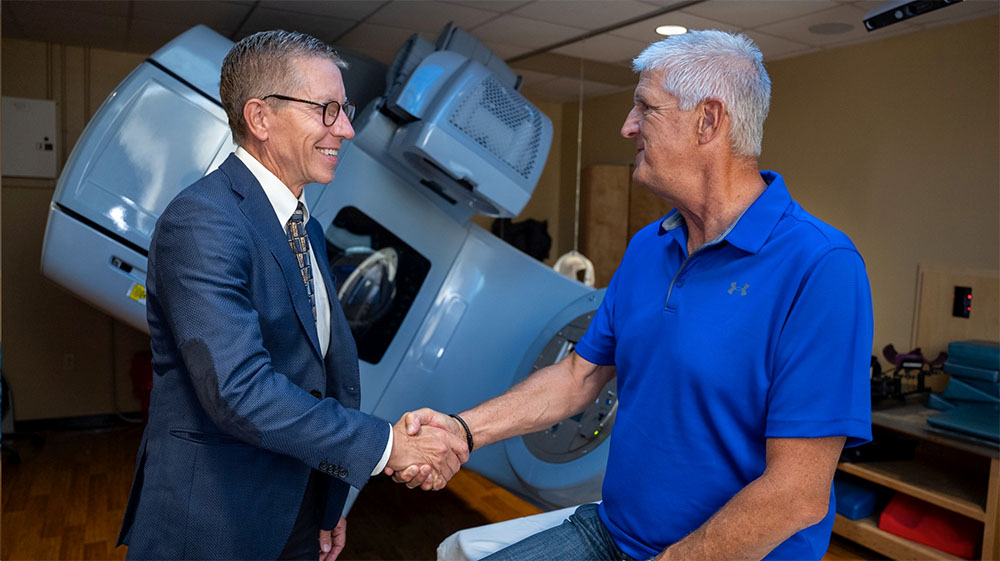About 1 in 8 men will be diagnosed with prostate cancer during their lifetime, usually after age 65. This common cancer often grows slowly and may not cause significant harm in its early stages, but some forms of prostate cancer can be aggressive and spread rapidly to other parts of the body. This Men’s Health Month, Arizona Oncology radiation oncologist Dr. Curtis Mack weighs in on what you need to know about prostate cancer.
Starting the Journey
Have you or a loved one been newly diagnosed with prostate cancer? Prostate cancer management can follow many paths. It can be difficult to know what to do next, but you do have some control. “Start the process with your urologist to determine the stage of the disease,” says Dr. Mack. Next, he recommends setting up a consultation with a radiation oncologist and considering a second opinion from another urologist. “Knowing all your options is crucial before deciding on the best treatment plan,” Dr. Mack says.
Learn more about reading a prostate cancer pathology report and the Gleason score.
To Treat or Not to Treat
For some patients, active surveillance or “watchful waiting” is a viable option, especially if the cancer is in its early stages and not causing symptoms. Active surveillance involves regular monitoring through PSA tests, digital rectal exams, and sometimes biopsies, to keep an eye on the cancer’s progression. This approach allows patients to avoid or delay more aggressive treatments while still keeping the cancer under close observation. However, for more advanced or aggressive cancers, treatments such as surgery, radiation, or hormone therapy may be necessary. Your health care team will help you weigh the benefits and potential side effects of each treatment option to make an informed decision.
The Role of Radiation Therapy
Dr. Mack sees many prostate cancer patients, as radiation therapy is a cornerstone of prostate cancer treatment. “It has an excellent track record,” Dr. Mack says of radiation therapy for prostate cancer. Treatment is delivered externally on a daily basis or internally (called brachytherapy) using permanent or temporary radioactive seeds. Sometimes the two are combined depending on the stage of the disease and the health status of the patient. “Some of our best results are with a combination of both,” Dr. Mack adds.
Patients are often worried about side effects from prostate cancer treatment. Common short-term side effects include urinary frequency, urgency, and irritation, along with less-common gastrointestinal issues. Long-term side effects can include changes in erectile function and a small risk of urinary incontinence or leakage.
As a cancer survivor himself, Dr. Mack understands the emotions that come with undergoing cancer treatment. “I think it has made me a bit more empathetic for patients when they are going through treatment and having acute side effects, wondering if they will ever get better. I like to say that yes, they will. You just have to get through the treatment.”
Reducing Side Effects with Hydrogel Spacers
At Arizona Oncology, our use of innovations like SpaceOAR and Barrigel hydrogels have significantly reduced the side effects associated with radiation therapy for prostate cancer. These FDA-approved substances provide protection to the rectum and other nearby structures during treatment. The hydrogel is injected into the space between the rectum and prostate where the soft, gel-like material expands to create a protective space. This reduces the radiation dose delivered to the rectum.
Dr. Mack has seen the impact of these cutting-edge advancements firsthand with his patients. “SpaceOAR and Barrigel have been effective in lowering both acute and long-term radiation side effects in the rectum,” says Dr. Mack.
Women, What Does Prostate Cancer Have to Do With You?
While the emphasis may be on men’s health this month, women have a big role to play. Dr. Mack recommends that women encourage the men in their lives to keep up with prostate cancer screenings, including the PSA test. This blood test, which is often done along with a digital rectal exam, is able to detect prostate cancer at an early stage. “Screening is important,” Dr. Mack urges. “Many prostate cancers can be followed because they are early enough to undergo active surveillance but for others, the sooner we know about them, the better our treatment options and outcomes.”
If your significant other or family member has already received a diagnosis of prostate cancer, your support will be paramount. “Encourage the patient to drink plenty of fluids and remain active,” Dr. Mack recommends. “Physical activity helps with both physical and mental wellbeing.”
During Men’s Health Month, encourage your loved ones to keep up with their regular screenings, including prostate cancer screenings. Dr. Mack’s expertise reminds us that while a prostate cancer diagnosis can be daunting, understanding and exploring all options can help patients and their loved ones navigate the complex journey of prostate cancer treatment with greater confidence, clarity, and hope.



